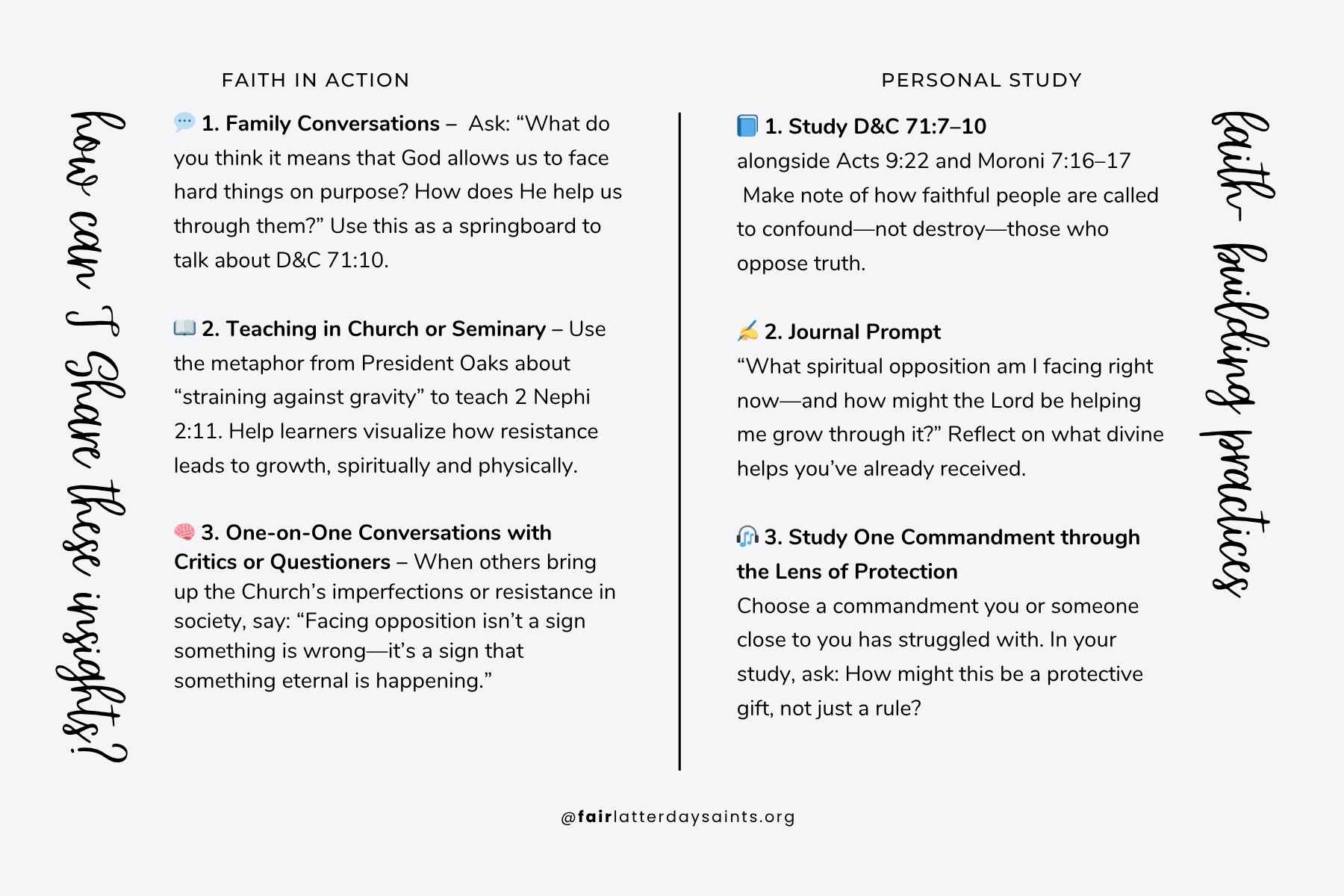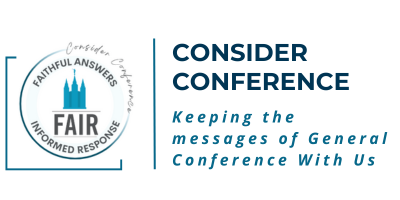
Choosing Christ in a World of Opposition
Have you ever felt disoriented by how much resistance seems to follow faithful living? Whether in a classroom, a family gathering, or scrolling through your feed, you may have encountered voices that belittle your beliefs, question your values, or mock your faith in prophets and scripture.
In his message Divine Helps for Mortality, President Dallin H. Oaks of the First Presidency affirms a profound and empowering truth: opposition is not a sign that something is wrong—it’s a sign that something eternal is at stake. God’s plan doesn’t shield us from difficulty; it places us in it—so we can choose Christ, grow in spiritual strength, and become something more than we were.
Drawing from the premortal conflict in heaven and the mortal reality of temptation, sin, and rejection, President Oaks teaches that moral agency—especially in the face of opposition—is central to God’s plan. He reminds us that “mortal growth requires us to strain against Satan’s temptations and other mortal opposition.”
This insight echoes the Lord’s charge in Doctrine and Covenants 71:
“Confound your enemies… let them bring forth their strong reasons against the Lord… there is no weapon that is formed against you shall prosper” (D&C 71:7–9).
President Oaks’ remarks help us reframe our view of adversity. What if opposition isn’t something to escape—but something to engage, faithful and unafraid, with truth, covenants, and divine help?
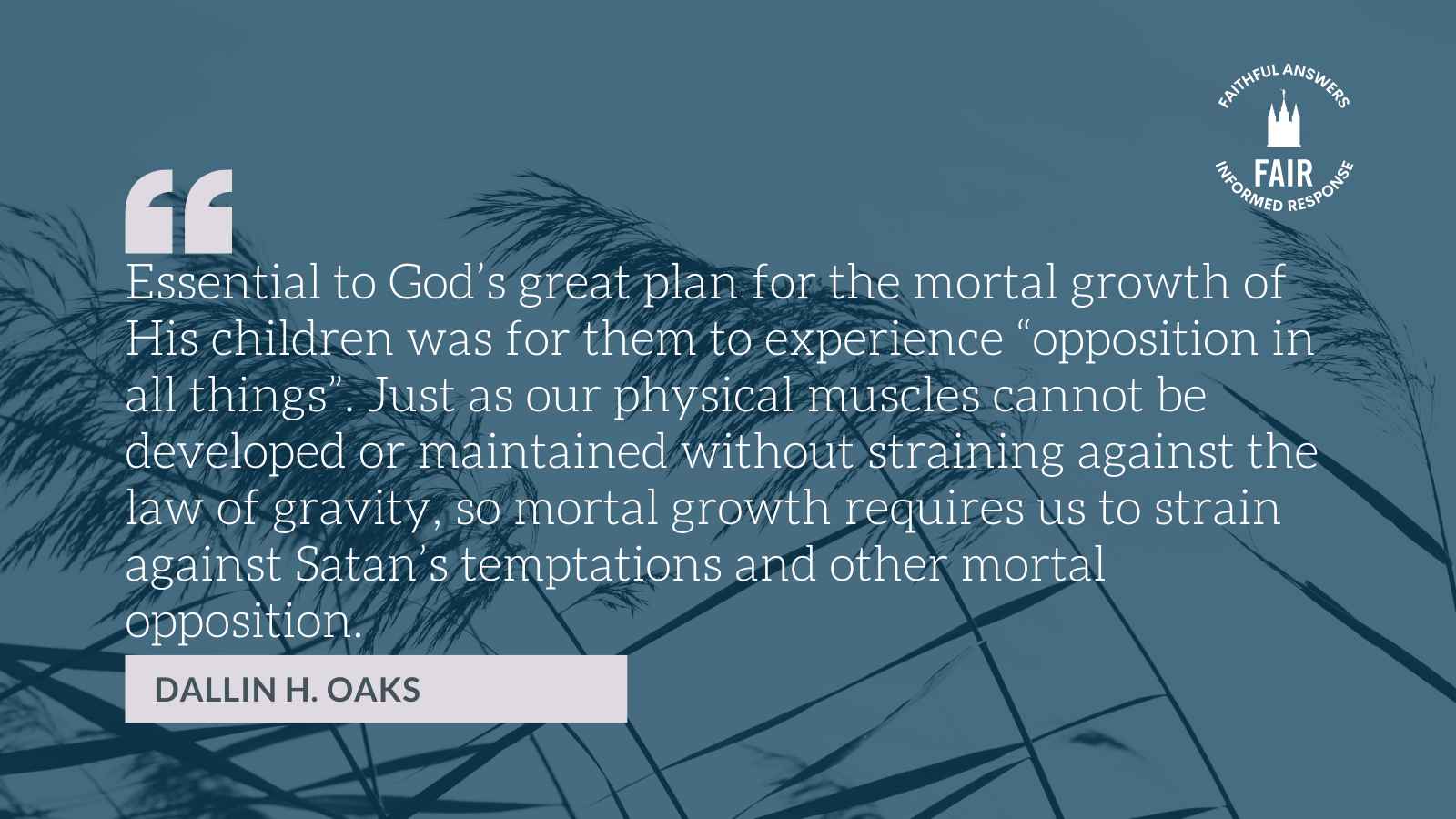
Apologetic Issues: Moral Agency & Prophetic Commandments
Criticism: “If God really loves us, why does He allow so much opposition—especially to His own people?”
Response: Opposition is not a sign that something has gone wrong in God’s plan—it is part of the plan. President Oaks teaches that “mortal growth requires us to strain against Satan’s temptations and other mortal opposition.” Choosing righteousness in a world that resists it is what transforms disciples into Saints. In Doctrine and Covenants 71, the Lord sends Joseph and Sidney directly into opposition—not to avoid it, but to confound it with truth and the Spirit (D&C 71:7–10).
God allows opposition so that His children can use their moral agency to grow, choose Christ, and become like Him. As President Oaks reminds us, the greatest growth comes through struggle—not ease.
Common Fallacy: False Dilemma – A False Dilemma presents only two options when more exist.
“Either God loves us and removes all opposition, or He doesn’t care.”
This argument overlooks the third, revealed truth—that God loves us enough to let us grow, even when it’s hard.
Solution: Recognize that divine love and mortal opposition are not opposites—they coexist in a plan that prizes growth through choice. That is real love.
Social Issue: The Commandments seem like a restrictive checklist.
Misconception: “The Church just gives too many rules. I want to follow Christ, not a checklist.”
Response: This critique often confuses commandments with control. President Oaks clarifies:
People who imagine commandments as the way God decides who to punish fail to understand this purpose of God’s loving plan of happiness.
Commandments are not punishment—they are protective structures, “guardrails” designed to keep us moving toward eternal joy. Even financial stewardship, accountability, and consecration are means to spiritual transformation and blessing (see D&C 72:3–5, 17–23).
Commandments, ordinances, and covenants do not restrict—they refine. They teach us how to walk with Christ, not just believe in Him.
Common Fallacy: Straw Man – A Straw Man misrepresents a belief to make it easier to dismiss.
“Latter-day Saints think they earn salvation by checking boxes.” In reality, the gospel teaches that obedience is not about earning, but becoming—it invites transformation, not transaction.
Solution: Replace checklist thinking with covenant discipleship—where obedience isn’t a list, but a relationship.
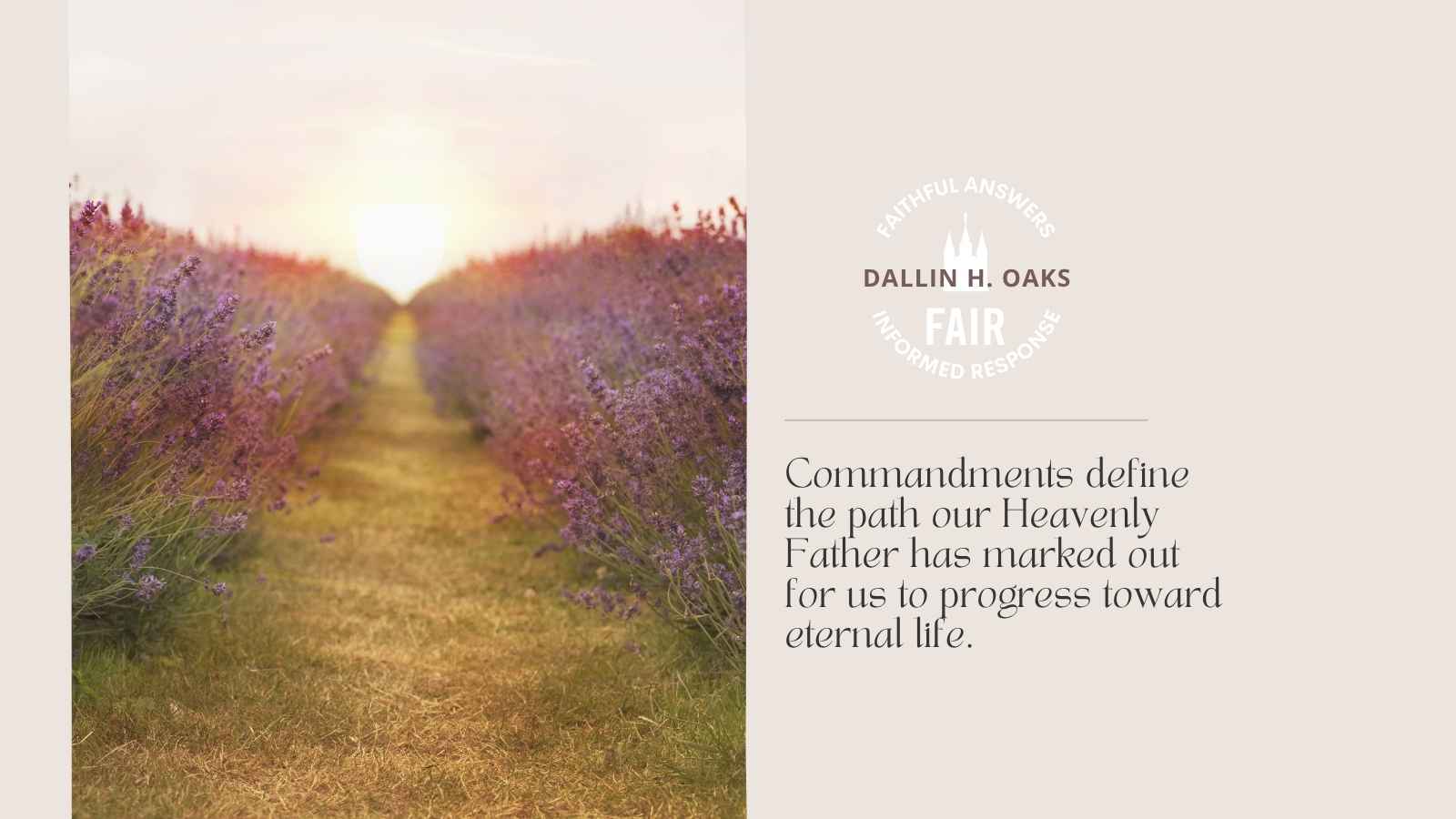
Apologetic Application: Moral Agency Amid Opposition Is a Divine Trust, Not a Design Flaw
President Dallin H. Oaks’ talk Divine Helps for Mortality affirms a bold and essential doctrine:
Opposition is a necessary condition of mortal experience, and moral agency is the God-given power to meet it with faith, growth, and righteousness.
This teaching directly addresses one of the most common questions critics and seekers ask: “If your Church is true, why does it get so much opposition?” Or more personally: “If God really loved me, why is this so hard?”
President Oaks testifies that mortal life was designed to include struggle, and that agency is not diminished by hardship—it’s magnified in how we respond to it. As he teaches:
Mortal growth requires us to strain against Satan’s temptations and other mortal opposition.
Defending Core Beliefs
1⃣ Opposition is Not a Sign of Failure—it’s a Sign of Eternal Purpose.
Some assume that hardship means either God is absent or the path is wrong. But Doctrine and Covenants 71 commands Joseph and Sidney to meet their critics head-on, with truth and power:
“Let them bring forth their strong reasons against the Lord” (D&C 71:8).
Far from being protected from criticism, they were empowered to confront it.
This teaches that opposition is part of discipleship, not proof against it.
2⃣ Agency in Adversity Proves Eternal Potential.
Critics often say: “If God really loved us, He wouldn’t let people suffer, sin, or fail.”
But President Oaks reminds us that growth only comes when we must choose between real options—good or evil, trust or fear, faith or failure:
Most important for spiritual growth is the requirement to choose between good and evil.
This aligns with 2 Nephi 2:11, echoed in Divine Helps for Mortality—without opposition, progress would be impossible. Agency isn’t just a permission; it’s a divine entrustment.
Practical Apologetic Use: When someone says, “Your Church has too many critics to be true,” you might reply:
“Actually, we’re promised opposition—and instructed to face it with truth, not silence. Growth doesn’t mean avoiding conflict—it means choosing faith in the middle of it.”
Discipleship is not a stroll through calm weather. It is more like walking into the wind.
When you walk into the wind, every step requires focus, effort, and resolve. The air resists you—pulling at your clothing, pushing against your face. It would be easier to stop. But the strength comes in the striving. That resistance is not a sign you’ve lost the path—it’s confirmation you’re still moving forward.
Historical and Doctrinal Connections
Throughout scripture and in every dispensation, the Lord has permitted His children to face opposition—but always with divine helps to guide, strengthen, and protect them. From the war in heaven (Revelation 12; Moses 4), to Nephi’s “opposition in all things” (2 Nephi 2:11), to the ministry of early Restoration prophets confronting hostile voices, God’s pattern is clear: He does not shield His people from adversity—He equips them to face it.
President Dallin H. Oaks draws on this eternal pattern in Divine Helps for Mortality, teaching that:
Mortal growth requires us to strain against Satan’s temptations and other mortal opposition.
This echoes the Lord’s instructions to Joseph Smith and Sidney Rigdon in Doctrine and Covenants 71, where they are commanded not to retreat from opposition, but to step forward and confound falsehood with truth:
“Confound your enemies… let them bring forth their strong reasons against the Lord” (D&C 71:7–8).
“There is no weapon that is formed against you shall prosper” (v. 9).
This is more than a historical moment—it is a doctrinal principle. Every Saint, in every age, is expected to engage opposition with agency, confidence, and covenantal power.
Doctrine and Covenants 72 adds another dimension: the idea of stewardship, especially in fulfilling divine assignments and giving account before God:
“It is required of the Lord, at the hand of every steward, to render an account of his stewardship” (D&C 72:3).
“Let every man be diligent in all things” (D&C 75:29).
President Oaks affirms that our path is marked by commandments, ordinances, and covenants—not to burden us, but to bless and enable us:
Commandments define the path our Heavenly Father has marked out for us to progress toward eternal life.
This perspective reframes both external criticism and internal hardship. It clarifies that opposition is not divine neglect—it’s divine design, and that commandments are not restrictive rules—they’re redemptive routes.
Living Apologetics: How to Apply This Today
 How can we help others understand that opposition isn’t failure—and that commandments aren’t control?
How can we help others understand that opposition isn’t failure—and that commandments aren’t control?
President Dallin H. Oaks teaches that opposition is an intentional part of God’s plan, and that commandments, covenants, and divine helps are not restrictions—they are spiritual scaffolding that help us climb. This has real apologetic power when addressing critiques that faith is repressive or that the Church “gets in the way” of personal authenticity.
Principle in Practice: Two Ways to Apply Apologetic Principles
1⃣ Reframe Struggles as Sacred Opportunities
When someone says, “If this Church were true, why would it face so much opposition?”
→ Respond: “Opposition is part of every divine pattern in scripture. God allows it because He trusts us to grow—and provides us help along the way.”
Support with D&C 71:9 and Oaks: “Mortal growth requires us to strain.”
2⃣ Explain Commandments as Empowering, Not Oppressive
When a loved one says, “There are too many rules. I just want to follow Christ.”
→ Try: “We do follow Christ. That’s what commandments help us do. They’re like trail markers in the wilderness—they don’t confine, they keep us safe.”
Link to D&C 72:3 and Oaks: “Commandments define the path… to progress toward eternal life.”
Top Apologetic Facts
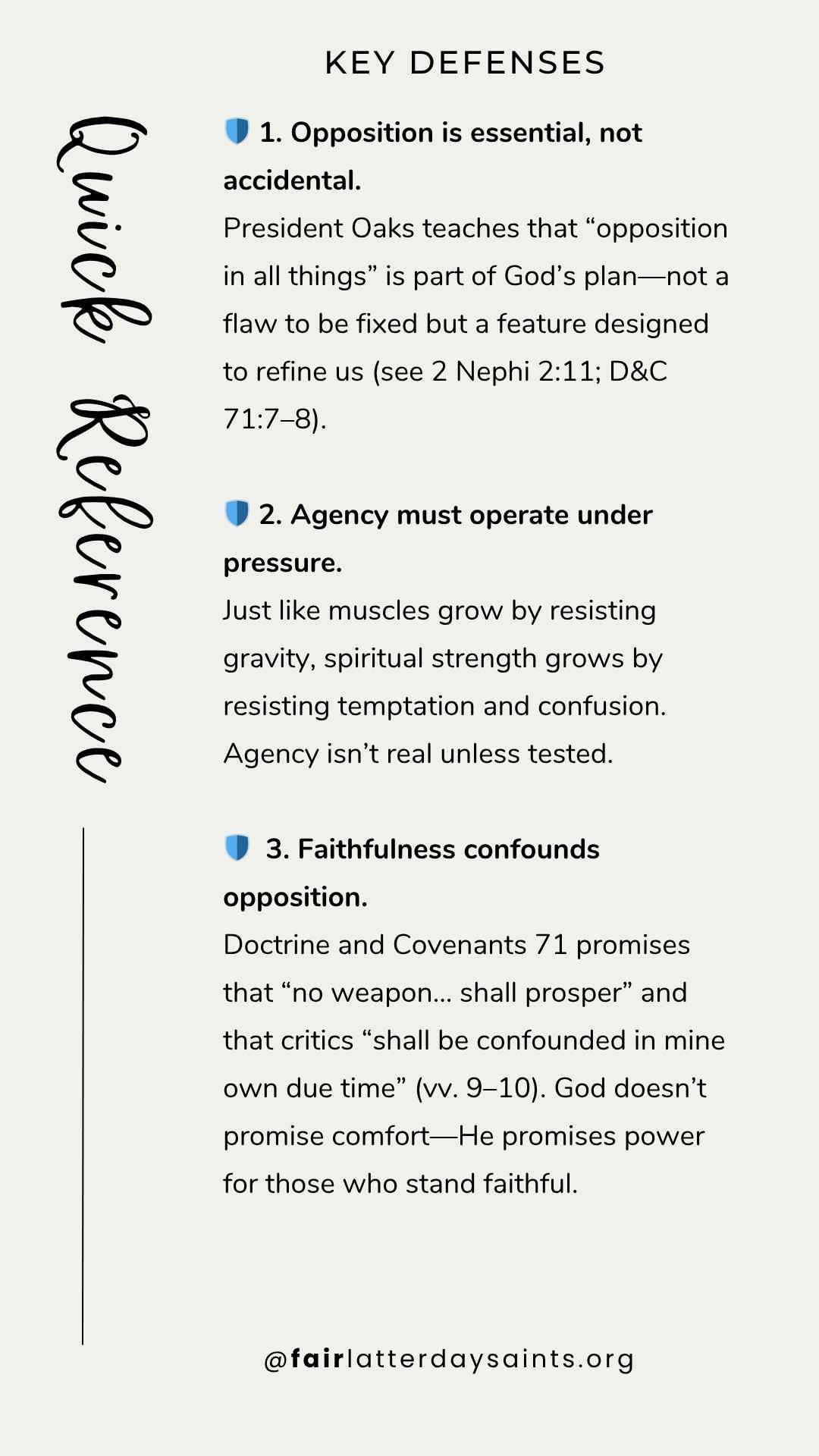
 1. Opposition is a condition of mortality—not a contradiction of truth.
1. Opposition is a condition of mortality—not a contradiction of truth.
Doctrinal Insight – President Oaks teaches that “mortal growth requires us to strain against… opposition” (cf. 2 Nephi 2:11). Doctrine and Covenants 71 shows the Lord sending His servants directly into controversy—not to avoid it, but to engage and confound it with faith and truth.
 2. Commandments are covenantal helps—not restrictive rules.
2. Commandments are covenantal helps—not restrictive rules.
Practical Application – President Oaks reframes commandments as part of a “loving plan of happiness.” Doctrine and Covenants 72 teaches that rendering an account of stewardship is part of becoming “a wise steward” (v. 17), emphasizing that obedience isn’t about control—it’s about growth and trust.
 3. The Lord empowers disciples to defend the faith with clarity and confidence.
3. The Lord empowers disciples to defend the faith with clarity and confidence.
Historical Context – Doctrine and Covenants 71 was given in response to public opposition. The Lord instructed Joseph and Sidney to “confound your enemies” (v. 7) and promised that “no weapon… shall prosper” (v. 9). Latter-day Saint apologetics is rooted in revelation, not reaction—and meant to build faith, not contention.
Conclusion: Growing Through Opposition, Choosing Christ Again
President Dallin H. Oaks reminds us that we are not left alone in a hostile world—we are equipped, empowered, and entrusted. God’s plan doesn’t eliminate difficulty; it transforms it into growth. Through divine helps—like the Light of Christ, the commandments, covenants, the gift of the Holy Ghost and especially the atonement of Jesus Christ—we are not only sustained through opposition but sanctified by it.
In Doctrine and Covenants 71, Joseph and Sidney were commanded to step into criticism with confidence, armed not with bitterness, but with truth and the Spirit. In Doctrine and Covenants 72–75, the Lord teaches that discipleship means accountability, diligence, and unwavering trust.
President Oaks’s message reaffirms that commandments are not chains—they are channels for power. Opposition is not a punishment—it is part of the pattern, and agency is not something to survive with, but something to use in becoming more like Christ.
This week, as you reflect on your own spiritual path, consider this:
Are you viewing opposition as a barrier—or as an invitation to grow?

“Commandments define the path our Heavenly Father has marked out for us to progress toward eternal life.” —President Dallin H. Oaks
The Consider Conference series by FAIR offers an in-depth look at recent General Conference talks to help members of the Church of Jesus Christ of Latter-day Saints navigate common questions, misunderstandings, and criticisms. Each post provides doctrinal insights, historical context, and practical ways to apply gospel principles in everyday conversations. Through this series, we hope to equip readers with faith-promoting resources that encourage thoughtful reflection, respectful dialogue, and a stronger foundation in gospel truths, fostering both personal conviction and meaningful discussions with others.
The post Straining Against the Wind appeared first on FAIR.
Continue reading at the original source →




